[This post my second entry of the F# advent calendar 2015 series. You can also read the first post about “Using Async.Choice in Paket“]
Recently I was asked to help with a website that was based on suave.io. The task was to transform the existing F# script based suave.io website to something that can be run in the enterprise infrastructure and also performs some background tasks like creating Excel reports recurringly.
Suave as a (windows) service
A lot of the suave.io samples work with simple .fsx script files. This approach is indeed simple and allows fast prototyping with the use of the REPL. Even more complex websites like fssnip.net are using this approach with great success (code here). One of the benefits of script based suave solutions is that they are often equipped with a FAKE build script that rebuilds the website automatically if someone changes a file. One prominent example is FsReveal:

But sometimes you want to have a “real Visual Studio project” with debugging support and your enterprise might want to install¬†your website as a Windows service. So the first step was to convert the F# script based approach into a project and adding TopShelf layer to make it runnable as Windows service. Thanks to a short blog post by Tomas Jansson this was super easy. It’s basically just installing TopShelf.FSharp via Paket¬†and adding a single file with the config. Look into Tomas’s blog post to see the details.
After moving to the TopShelf model we still wanted to have automatic website rebuild whenever someone touched the source code. This little FAKE script makes this possible:
Running background jobs
The website already allowed to generate Excel reports by clicking somewhere in the UI. In addition to that we wanted to create the Excel reports recurringly in background jobs.¬†Scott Hanselman has a blog post about “How to run Background Tasks in ASP.NET” and shows a couple of¬†solutions that while optimized for ASP.NET would probably work with suave.io as well. But in this case we wanted to have something that syncronizes with the IO of the website so we decided to use F#’s MailboxProcessor feature a.k.a. “agents”. (As always: Scott Wlaschin has a nice introduction to agents.)
As a small intro into background jobs we start with F# counter agent sample by Tomas Petricek:
This little snippet shows an agent that calculates averages of the messages that it receives. Now let’s add a background job that recurringly sends messages to the counter agent:
In order to use this we need a bit of ugly infrastructure code that we will hide in a library:
So let’s try this out in the F# interactive:

Since this works as expected we can use it in our website:
Since all the user triggered reporting will also go through this taskAgent we ensure that IO is synchronized.
Sample project
In https://github.com/forki/backgroundjobs you can find a sample project which does exactly the two points from above.

As you can see the website performs background jobs and is rebuilding/restarting automatically when a source code file is saved.
Tags:
F#,
fsadvent,
fsharp
[This post is part of the F# advent calendar 2015 series.]
Prologue: What is Paket?
Paket¬†is a dependency manager for .NET with support for NuGet packages and GitHub repositories. It enables precise and predictable control over what packages the projects within your application reference.¬†If you want to learn how to use Paket then read the “Getting started” tutorial and take a look at the FAQs.
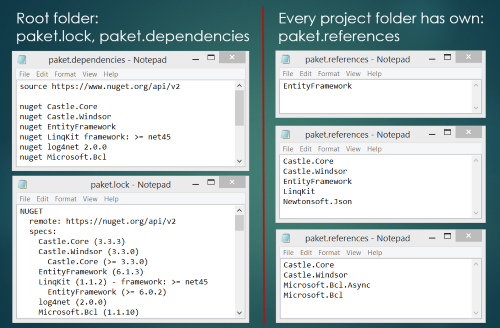
Async computations in F#
Asynchronous Workflows are a very old F# feature (they already shipped in 2007) and¬†they are¬†used in many places in Paket. In this article I want to highlight one of the nice applications that F#’s async model allows you.
Many readers are probably familiar with C#’s async and await keywords (IIRC released with C# in 2012), but F#’s async feature works a little different.¬†You can read more about some of “Asynchronous gotchas in C#” in Tomas Petricek’s excellent blog post. Most of these gotchas come from the fact that C# is starting all async tasks automatically while F# wraps the logic in data and allows you to run it explicitly. For a really good introduction to asynchronous programming with F# I can recommend Scott Wlaschin’s blog post.
The issue: retrieving version numbers from NuGet feeds
Paket’s package resolution algorithm (if you are interested in algorithms then read more) needs to know which versions are avalaible for a given package. Usually users specify more than one NuGet feed and different NuGet feeds support different protocols. The following code shows how older Paket versions retrieved all version numbers for a given package across all configured NuGet feeds:
As you can see getAllVersions tries 4 different NuGet protocols per source and returns the first result that is not None. Every getVersionsViaProtocol call performs async web request. In GetAllVersions we run this function for every NuGet source in parallel and combine the results. This code is very similar to the “async web downloader” sample in Scott Wlaschin’s async blog post¬†and basically the “hello world” of asynchronous programming.¬†
Code cleanup
The getAllVersions is deeply nested and it’s hard to understand what’s going on. With the help of List.tryPick we can rewrite the code as:
List.tryPick returns the first result that is not None. So instead of nesting multiple match and let! expressions we use a higher-order-function to encapsulate the same pattern.
Introducing Async.Choice
After using this code for a while in Paket we noticed that different NuGet server implementations each implement a different subset of the 4 protocols and differ very much in the response times. So there was no order of the protocols that would work good for all server implementations. But what if we could query all 4 protocols in parallel and just take the fastest response?
The change is relatively easy and we can rewrite the GetAllVersions as:Instead of running the web requests synchronously and in order we run the four web request per NuGet feed in parallel and take the first response that is not None.
Implementation of Async.Choice
Unfortunately Async.Choice is not part of the standard FSharp.Core library and it turns out it is not easy to implement. There are many different implementations floating around on the internet. The one we use in Paket is by Eirik Tsarpalis and taken from fssnip. One of the advantages of this version is that the automatic cancellation of tasks works nicely. Since we are running lots and lots of web requests in parallel and always take the first response we want to cancel all the other pending web requests. Otherwise we would basically DDOS the feeds with useless requests (and yes that happened to us ;-)). Since Async.Choice is very useful we sent a pull request to the Visual F# project and hope that one day it will be in the box. 
Epilogue
Treating computations as data has even more advantages. The m-brace project created a new version of computation workflows called “cloud”:
cloud¬†is a computation workflow builder and allows you to run your computations in the cloud. In¬†contrast to async we don’t only control when something gets executed but also where. They even have a Cloud.Choice, which allows you to run tasks asynchronous in the cloud and take the first succeeding result.
Btw:¬†async and cloud aren’t language keywords like C#’s async and await, but implemented as normal F# code in libraries. If you want to¬†define your own computation expression builders, then the MSDN docs are a good starting point.
Tags:
async,
F#,
fsadvent,
fsharp
As many readers already know I’m maintaing the open source projects FAKE and Paket. These projects are used in many companies and open source projects to make continuous integration work on .NET and mono.
In this article series I want to highlight some of the more unsual use cases. Today I want to start and highlight the first 6 amazing projects.
FsReveal
“FsReveal allows you to write beautiful slides in Markdown and brings C# and F# to the reveal.js web presentation framework.” [project site]
FsReveal uses Paket’s GitHub file dependencies¬†feature to download reveal.js:
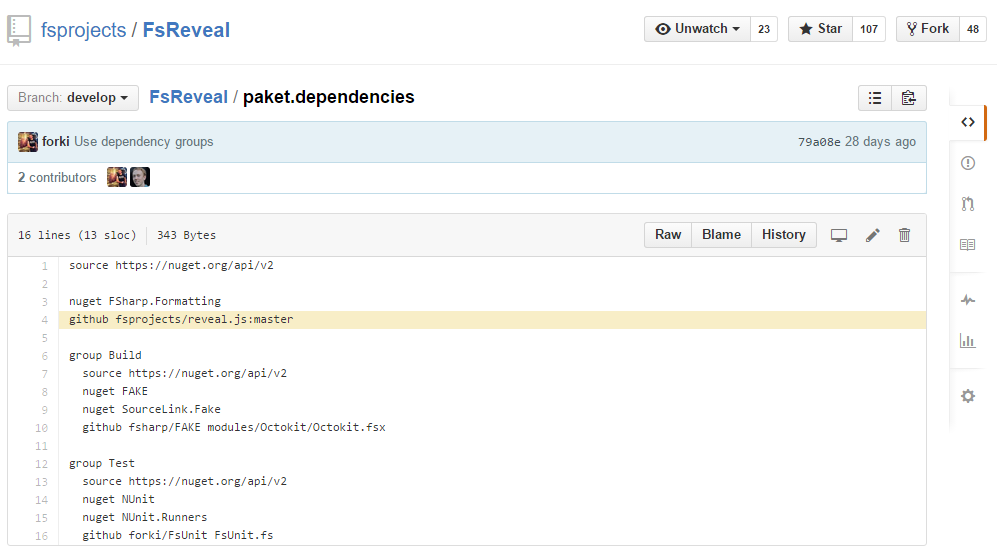
It also uses¬†a FAKE build script which converts Markdown files to html slides (via FSharp.Formatting) and runs these slides in a suave.io web server. FAKE’s file system watcher + suave’s socket implementation even allows you to edit your slides with automatic preview:

Stanford.NLP.NET
“Stanford.NLP for .NET is a port of Stanford NLP distributions to .NET.
This project contains build scripts that recompile Stanford NLP .jar packages to .NET assemblies using IKVM.NET, tests that help to be sure that recompiled packages are workable and Stanford.NLP for .NET documentation site that hosts samples for all packages. All recompiled packages are available on NuGet.” [project site]
This project downloads .jar packages via Paket’s HTTP dependencies¬†feature,¬†recompiles everything to .NET via IKVM.NET in a FAKE build script and republishes it on NuGet. Automatic Java to .NET compilation – how cool is that?
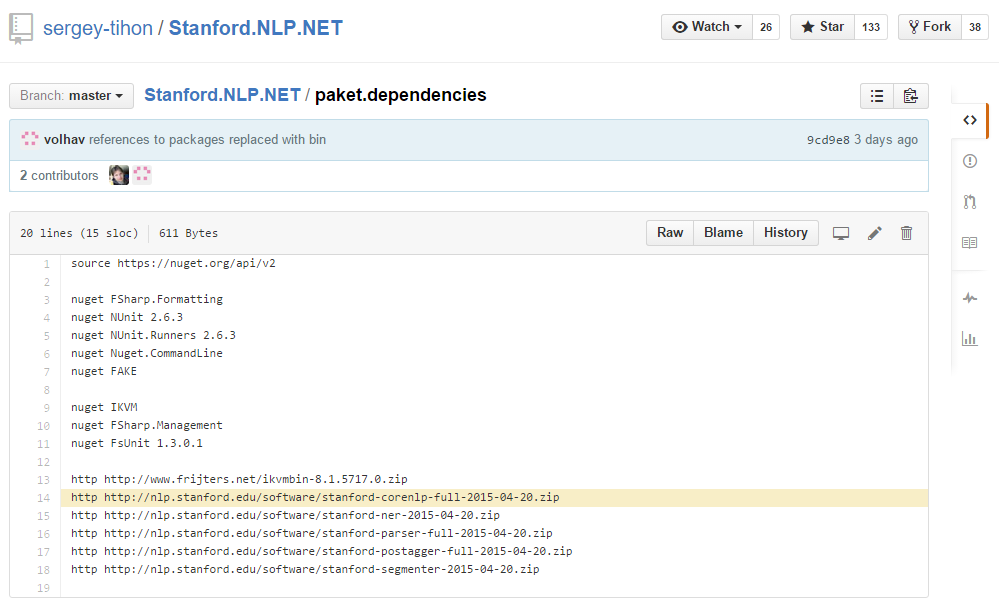
Paket.VisualStudio
“Manage your Paket dependencies from Visual Studio!” [project site]
Paket.VisualStudio is a VisualStudio addin that you can download from Microsoft’s VisualStudio gallery. Unfortunately even in 2015 Microsoft doesn’t provide an API for automating the upload to its gallery. Therefore Paket.VisualStudio¬†uses Paket’s NuGet dependencies¬†feature to download canopy and Selenium:
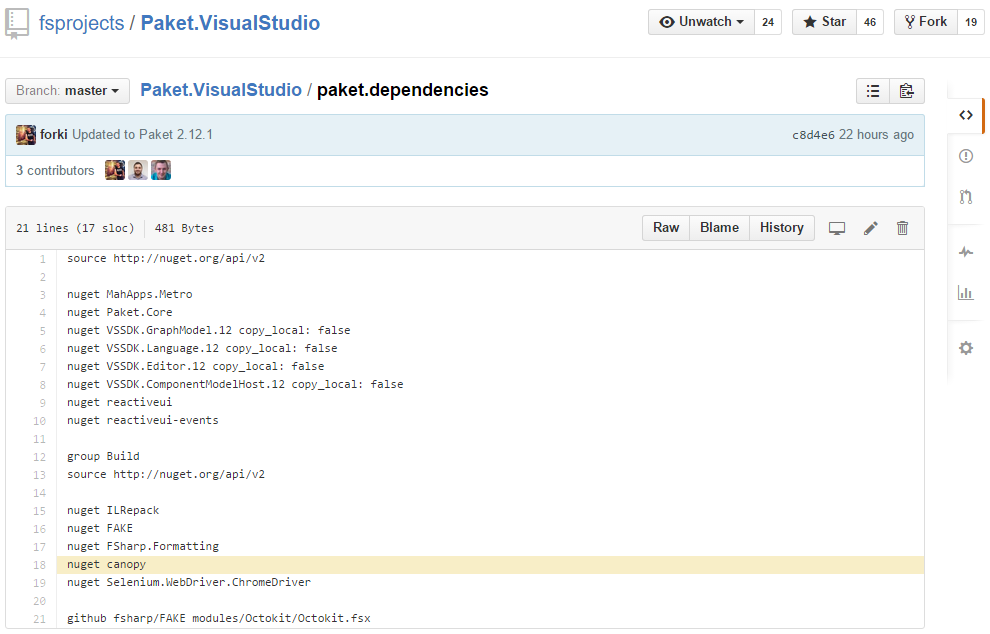
It then uses canopy + Selenium in a FAKE script to upload the addin via browser automation:

Ionide-F#
“It’s part of Ionide plugin suite. F# IDE-like possibilities in Atom editor” [project site]
Ionide is an Atom plugin written in F#. It’s using Paket and FAKE to automate the build and release process.
First it uses FunScript to transpile F# to Javascript and then automates npm to resolve Javascript dependencies and apm to upload the plugin to the Atom gallery.
Akka.Net
“Akka.NET is a community-driven port of the popular Java/Scala framework Akka to .NET.” [project site]
Akka.Net is a big (mainly C#) open source project that uses FAKE and Paket. One interesting observation is that it needs to create¬†different xUnit addins and therefore uses Paket’s groups feature to maintain the xUnit versions.
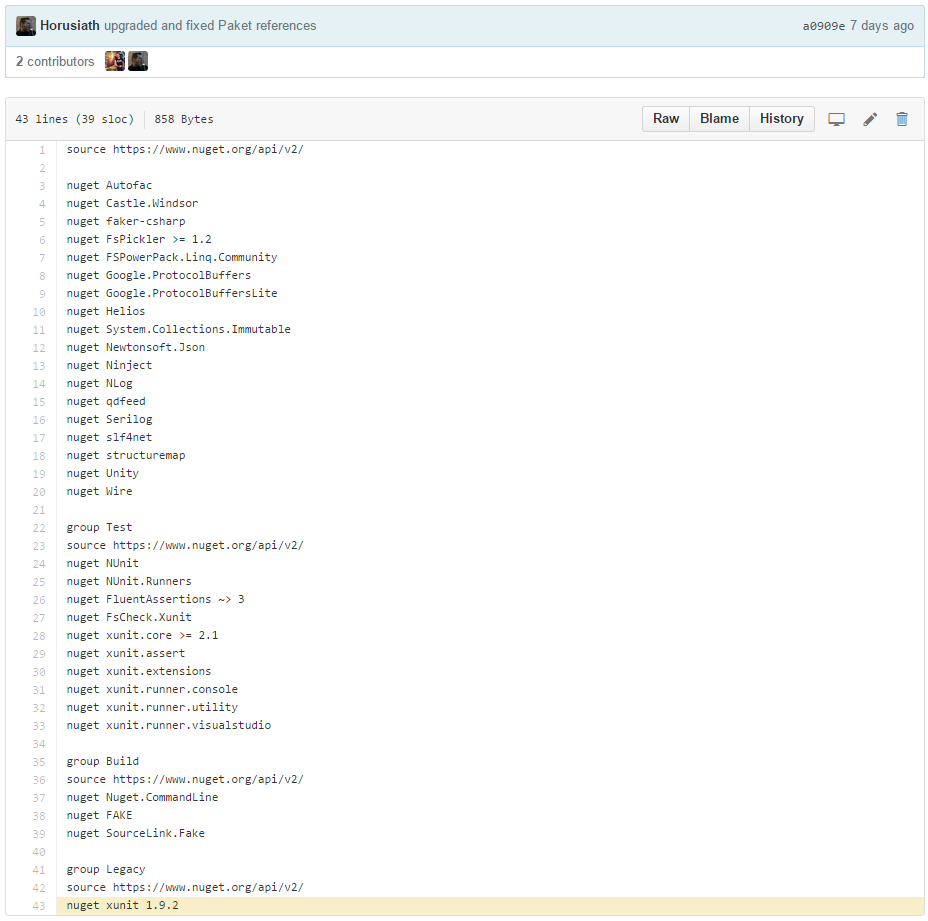
FSharp.Data
“The F# Data library¬†implements everything you need to access data in your F# applications and scripts. It implements F# type providers for working with structured file formats (CSV, HTML, JSON and XML) and for accessing the WorldBank data. It also includes helpers for parsing CSV, HTML and JSON files and for sending HTTP requests.” [project site]
One of the many interesting things in FSharp.Data’s build is that it uses Paket to retrieve the¬†FSharp.TypeProviders.StarterPack. These files need to be¬†included in any F# type provider project and Paket allows you to manage this easily.
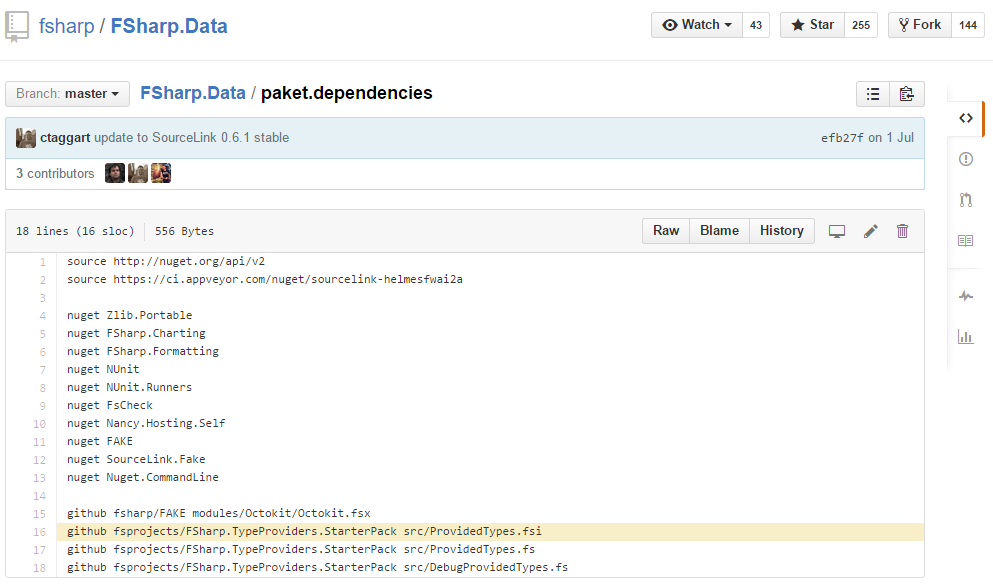
Tags:
F#,
F-sharp Make
Vor acht Jahren gab es die erste Ausgabe der (Un-)Konferenz mit dem Namen Developer Open Space¬†und sie findet dieses Jahr vom 16.‚Äď18. Oktober 2015 in Leipzig statt. https://frmedicamentsenligne.com
Für mich nach wie vor die beste technische Konferenz in Deutschland.Die Fotos von der Konferenz sprechen für sich.AnmeldungDie Anmeldung ist seit einiger Zeit möglich.Die Plätze sind begrenzt.Nimm teil!
I created a short presentation for our new .NET dependency manager Paket.
It’s created with FsReveal¬†and¬†MIT licensed. Please feel free to use/modify it for your own presentations.
http://forki.github.io/PaketIntro













